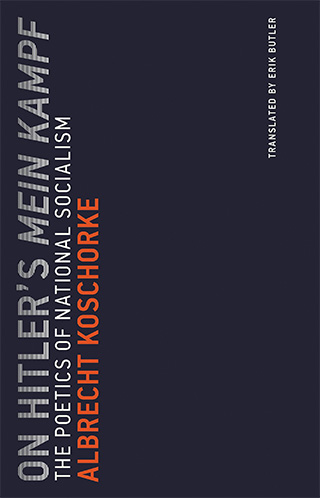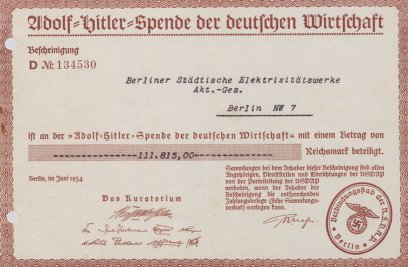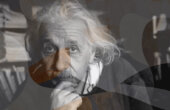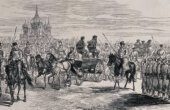‘Mein Kampf’ as a Propaganda Playbook

Hitler’s “Mein Kampf” was banned in Germany for almost 70 years, kept from being reprinted by the accidental copyright holder, the Bavarian Ministry of Finance. In December 2015, the first German edition of “Mein Kampf” since 1946 appeared, with Hitler’s text surrounded by scholarly commentary apparently meant to act as a kind of cordon sanitaire. And yet the dominant critical assessment (in Germany and elsewhere) of the most dangerous book of the 20th century is that it is boring, unoriginal, jargon-laden, badly written, embarrassingly rabid, and altogether ludicrous. (Even in the 1920s, the consensus was that the author of such a book had no future in politics.) How did the unreadable “Mein Kampf” manage to become so historically significant? In his short book “On Hitler’s Mein Kampf: The Poetics of National Socialism,” German literary scholar Albrecht Koschorke attempts to explain the power of Hitler’s manifesto by examining its narrative strategies. In the following excerpt, Koschorke argues that its effectiveness lies in its dual-layered messaging: For the masses, “Mein Kampf” provides a scapegoat for social ills and fuels racial hatred; for the initiated, it serves as a manual on gaining power through propaganda.
A legend surrounds Hitler’s bellicose work “Mein Kampf,” which has been served up time and again: In spite of its massive distribution to schools and libraries and despite the fact that it was handed out as a matter of duty at civil registries, the book is supposed to have remained unread because, all in all, it is unreadable. The legend warrants notice insofar as Hitler, in the preface, does not address himself to “strangers, but to those adherents of the movement who belong to it with their hearts.” Five hundred pages later, in the second volume, he bluntly declares that “the mass of people is lazy,” never reads books, and has only a brief attention span, anyway. Any readers who have stuck with him until this point may therefore consider themselves to number among the initiated — whose understanding comes at the expense of others. This fits with Hannah Arendt’s observation that totalitarian regimes are organized on the model of secret societies and operate according to a system distinguished by subtle gradations of participation. That said, the rub of the National Socialist ideology is that it openly displayed — to anyone with eyes to see — not just its popular [völkisch] and spectacular aspect but also, and to an astonishing degree, the arcana of its techniques of power.

Indeed, Hitler candidly discusses how to employ the tools of propaganda. This fact manifestly contradicts the widespread assumption that ideologies function only if they conceal the ways and means that they are fabricated. “Mein Kampf” is arranged so that one may read it on two levels. For pages on end, it holds forth about Marxist intrigue and Jewish freeloading. Thereby, it satisfies the same primitive, ideological hunger of readers who, a few years after the book’s publication, would feed on Julius Streicher’s newspaper, Der Stürmer. In this capacity, “Mein Kampf” stands as a testimony to blind racial mania. But for all that, Hitler does not present himself as a fanatical Jew hater from the outset. Instead, he makes a point of authenticating his anti-Semitism by depicting it as the result of a learning process. On this score, his account agrees with historical research, even if he backdates his “transformation.” No anti-Semitic remarks are recorded from his time in Vienna. He struck this tone only when declaiming in Munich beer halls — in other words, after his decision (dating to the “years of upheaval, in 1918–19”) to “go into politics.”
Verification of the facts, nuance, decorum, and “criteria of humanitarianism and beauty” are deemed irrelevant, consigned to a self-satisfied world apart, and subjected to ridicule.
Why does Hitler — who is so fond of declaring that even his earliest decisions were “unwavering” and who constantly undermines the principle of development inherent in autobiography by affirming that he has never changed any of his fundamental positions — not claim always to have held a “rock-solid” and “steadfast” opinion about world Jewry? One reason, as suggested above, is that he thought it more effective, in psychological terms, to meet readers on the level of whatever human compassion they still felt, instead of foisting a completed dogma on them. In the early stages of radical political movements, it is still necessary to consider skepticism on the part of those who have not yet been fully converted. However, the strategic placement of the conversion narrative points to a second aspect of the book concerned less with ideology itself than with its technical production.
At this juncture, a remark on the circumstances attending the genesis of “Mein Kampf” is in order. Even though it has long been rumored that parties close to Hitler contributed to the book’s writing, the greatest part was authored by Hitler himself, on his own. All the same — and counter to what the book itself claims — “Mein Kampf” is not the result of the individual’s power of creation. For one, the typescript was reworked on the way to press. Tellingly — and to the detriment of style — the changes introduced elements of speech into the written document. Nor is everything that the inmate at Landsberg Prison typed out early in the morning fashioned entirely from scratch. Hitler recorded what had proven successful in völkisch circles. Indeed, he did not even shape his own profile as a propagandist. Rather, he owed this image to the influence, support, and training provided by the Bavarian Reichswehr, which employed him as a contractor immediately after the war. Naturally, Hitler has to deny that his ideological fanaticism followed from personal opportunism. But “Mein Kampf” does not deny the strategic nature of the ideology of which the author has made himself the spokesman.
In consequence, Hitler’s look back at his years in Vienna serves two wholly different purposes. On the one hand, it is meant to obscure his much later — and much less ideologically commendable — calling as a political agitator. On the other hand, it tells political followers and allies, almost in textbook fashion, how to craft language suited for the masses: sharpen it to a single point and hold fast — “unwaveringly,” “with an iron will,” and so on.
“Mein Kampf” is constructed in such a way that confrontation with the Social Democrats and discussion of the “Jewish question” relate to each other as problem and solution. The treatment of the theme yields a kind of two-story structure. On the level of ideology, the essential message is that the eradication of Jewry — which is supposed to constitute the driving force behind capital and anticapitalism alike (conspiracy theories are confusing to the uninitiated) — will end class struggle as such. But in terms of party tactics, another aspect occupies the foreground — the demonization of political rivals who, in advancing partially similar sociopolitical measures, also claim to represent the masses. The narrative design of “Mein Kampf” is absolutely plain in this regard — and it is likely that the fact did not escape readers who were schooled in politics. On this level, attention does not fall on the what of ideology so much as the how of working it to propagandistic ends.
Evidence abounds that Hitler sought, above all, to address followers who were interested in the way that power is constituted [Machart von Macht]. For the narrower circle of his adherents, “Mein Kampf” provided a manual — which is also how such parties understood the book. Indeed, the very choice of this medium implies a practical orientation: Hitler thought that the effort required for reading would restrict the second, less obvious dimension of meaning to a select circle of likeminded individuals. Actual propaganda — Hitler leaves no room for doubt on this score — does not play out in the medium of writing but in declamatory agitation. Only an orator can instantly gauge the public’s reaction and adjust what he says accordingly, “until at length even the last group of an opposition, by its very bearing and facial expression, enables him to recognize its capitulation to his arguments”; only through speech, not written instruction, can the “resistance of emotions” be overcome.
On their own, these observations are not very original. Hitler hones them to make a point of significant import, however, when he declares that the effects of declamatory agitation provide the sole measure of their “truth.” An extended passage on the matter is revealing:
All propaganda must be popular and its intellectual level must be adjusted to the most limited intelligence among those it is addressed to. Consequently, the greater the mass it is intended to reach, the lower its purely intellectual level will have to be. … The more modest its intellectual ballast, the more exclusively it takes into consideration the emotions of the masses, the more effective it will be. And this is the best proof of the soundness or unsoundness of a propaganda campaign, and not success in pleasing a few scholars or young aesthetes.
Verification of the facts, nuance, decorum, and “criteria of humanitarianism and beauty” — in other words, all the guiding values of cultivated, bourgeois-academic discourse — are deemed irrelevant, consigned to a self-satisfied world apart, and subjected to ridicule. This anti-academic tone, which hands the “scientifically trained intelligentsia” over to open contempt, has nothing original about it, either. Hitler shares this view with a host of populist sectarians at the turn of the century, from whose writings he drew — parties who had forged an autodidactic and megalomaniacal counterworld to the sphere of professional academics. The credo of these “theoreticians of race and explainers of the world” held that conventional scientific or scholarly accuracy does not matter. With that, they made the intellectual edifice they tinkered together impervious to objections from academic experts. Moreover, the same means that sectarians use to seal themselves off into elitist circles can be struck into populist coin, provided it achieves resonance. Ultimately, it serves a large-scale political ideology that need not worry about being proven wrong so long as it continues to produce desired effects. When the “accuracy or inaccuracy of propaganda” is measured only in terms of “success,” it closes itself off into a tautological circle of self-verification: It garners belief because it presents itself as the truth, and it counts as true because the masses believe in it.
It is supposed to make “everyone … convinced that the fact is real”; therefore, it excludes debate of the matter’s merit — or lack thereof.
Here, a factor enters the equation that is consistently underestimated by those who view only error, blindness, or illusion at work in demagoguery — and, accordingly, seek to oppose it by means of reasonable objections. Counter to what such enlightened optimists believe, the demagogue — along with those in his train — usually knows full well what he is doing. He does not advance his claims in spite of the fact that they will offend reasonable people but because he can be sure to provoke them by doing so. The reflexive outrage he triggers does not unsettle him; rather, it affords him a kind of contemptuous exhilaration. In “Mein Kampf,” Hitler openly declares that propaganda is a means to an end. It is supposed to make “everyone … convinced that the fact is real”; therefore, it excludes debate of the matter’s merit — or lack thereof. Propaganda’s “very first precondition,” according to Hitler, is a “basically subjective and one-sided attitude … toward every question it deals with.” Even though his rhetoric does not discount the truth as a category of appeal, in the broader context of everything else he writes, it represents a secondary consideration deriving from the power of speech itself — that is, something constituted in circular fashion by the efficacy and force of pure assertion.
When Hitler discusses the propagandistic fabrication of truth in the process of declamation, he elaborates a circular logic, too. The agitator, as described in “Mein Kampf,” entertains a direct connection to the feelings of the crowd that he is haranguing, and he seeks to absorb each and every swell of emotion. It is easy to picture how, during his early years in Munich, the author tested the guiding principles of his worldview for their rhetorical efficacy — until they finally seemed to be what the people actually believed. At the same time, Hitler stresses the need “to take a position in important questions of principle against all public opinion when it [assumes] a false attitude — disregarding all consideration of popularity, hatred, or struggle.” In other words, the Party is not allowed to subordinate itself to public opinion; it must command it. Here and elsewhere, Hitler formulates the matter in sexualized terms: “It must not become a servant of the masses but their master!” The point is not to subdue the audience by force, then, but to employ an imperious folksiness [Volkstümlichkeit] that is commensurate with the “feminine” disposition of the people — which must also be protected from “seducers” on the enemy side.
Albrecht Koschorke is Professor of German Literature and Literary Studies at the University of Konstanz. He was a Visiting Professor at the University of Chicago from 2004 to 2009. Koschorke is the author of “On Hitler’s Mein Kampf,” from which this article is excerpted.




